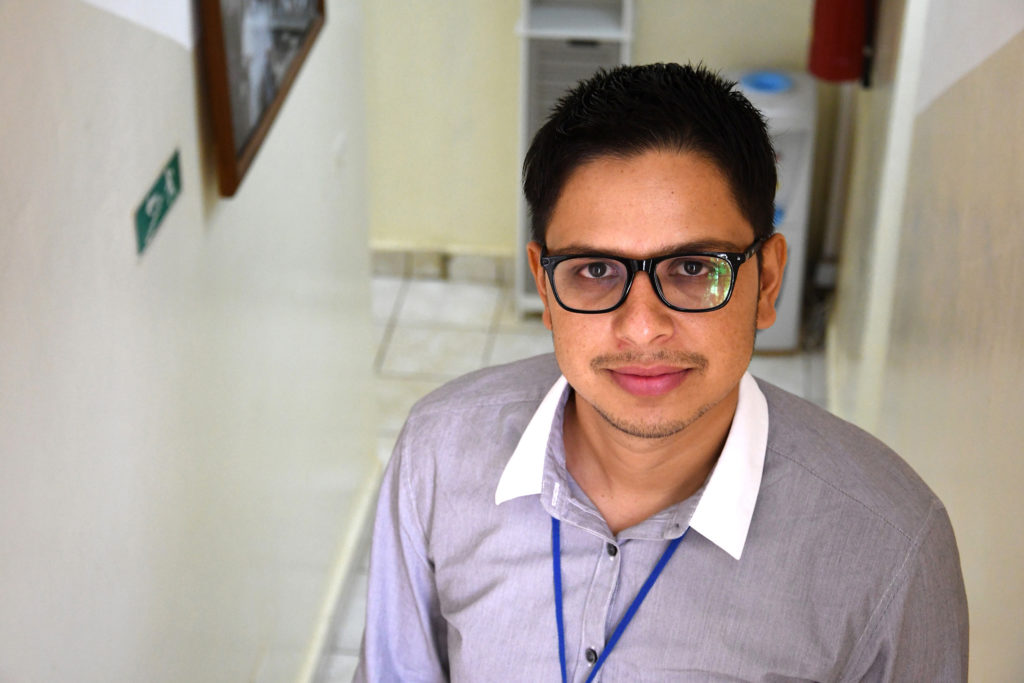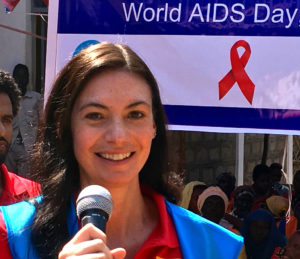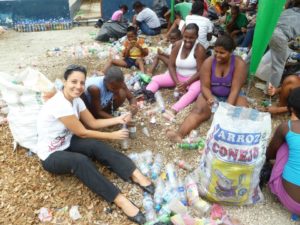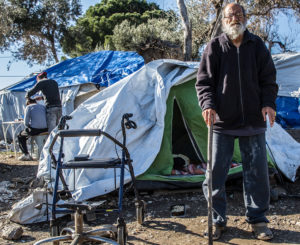Highlights
ICMC maintained a Deployment Scheme roster of 486 experts in resettlement, refugee status determination, complementary admission pathways and child protection.
Through the Deployment Scheme, ICMC deployed a total of 109 experts to UNHCR operations in 31 countries in Africa, Asia, Australia, Latin America and the Middle East and North Africa.
ICMC experts referred more than 50,100 vulnerable refugees for resettlement consideration to third countries and conducted “best interest of the child” assessments for nearly 1,700 children and their caregivers.
ICMC deployed 36 experts on short notice to UNHCR transit centers in Niger and Rwanda to support protection of extremely vulnerable refugees evacuated from detention centers in Libya.
ICMC deployed 112 experts to support UNHCR operations in Greece, providing technical expertise to the Greek government by seconding 65 of these experts directly to various State migration agencies.
ICMC experts in Greece responded to more than 12,700 requests for support from caseworkers processing requests for asylum and international protection.
The deployment of ICMC experts to the Greek Asylum Service contributed to more than 17,300 people acquiring refugee or subsidiary protection.
ICMC experts deployed as interpreters to UNHCR operations in Greece facilitated communications with vulnerable refugees in eight languages.

Carriers of Hope
Bharat Gautam’s job as an Associate Resettlement Expert involves interviewing refugees and hearing in detail about the haunting scars and trauma left by war, conflict or persecution.
The people he meets have been forced to flee their homes, leaving all behind, sometimes even family members. Some have also endured torture, the death of their children and close family members, rape and other sexual and gender-based violence. Their lives have been destroyed.
“I cannot easily erase some of their stories from my mind,” Gautam admits.
Deployed by ICMC to operations of the UN Refugee Agency, UNHCR, in Jakarta, Indonesia, Gautam determines whether vulnerable refugees can be resettled to a third country in view of their protection needs that prevent them from returning to their home country or remaining in the country where they have found refuge.
The ICMC expert says interviewing refugees is a rewarding experience despite hearing all that they have been through. He sees happiness on the faces of these women, men and children as they stand in front of him, full of expectation, determined to rebuild their lives. “We are able to give them much-needed hope,” he says.
Providing Protection Expertise Globally
ICMC’s partnership with the UN Refugee Agency, UNHCR, via its Deployment Scheme, entered its twentieth year in 2019. Through this collaboration, ICMC provides refugee resettlement and protection experts to UNHCR duty stations around the world, enhancing the agency’s capacity on the ground to protect vulnerable persons.
In 2019 ICMC maintained a roster of 486 experts in the areas of resettlement, refugee status determination, complementary admission pathways, child protection and prevention of sexual and gender-based violence. A total of 109 were deployed during the year to 31 countries in Africa, Asia, Australia, Latin America and the Middle East and North Africa.
The Deployment Scheme continued its close partnership with the Government of Canada’s agency for immigrants and refugees (IRCC). During 2019, thanks to IRCC’s generous support, ICMC was able to deploy 18 additional protection experts to UNHCR operations, mostly in Africa.
The majority of ICMC experts interviewed refugees for possible resettlement to a third country, while others focused on the protection of refugee children and of survivors of sexual and gender-based violence. Experts in refugee status determination assessed whether a person seeking asylum qualified for international protection as a refugee, that is, someone who has a “well-founded fear of persecution for reasons of race, religion, nationality, political opinion or membership in a particular social group.” These ICMC experts worked closely with governmental and nongovernmental partners.
A number of ICMC experts deployed to Niger and Senegal were involved in helping refugees receive protection and find long-term solutions through complementary admission pathways, in particular through family reunification and humanitarian corridors.
In 2019, ICMC experts submitted the cases of 50,147 vulnerable refugees for consideration for resettlement to third countries, a significant boost to UNHCR’s referral capacity.
ICMC child protection experts conducted assessments with 1,665 vulnerable children and their caregivers to determine a course of action in the child’s best interest. Throughout the interviewing process, ICMC experts counselled and advised refugees, helping them to manage expectations and mitigating potential fraud.

Effecting Change
Aleta Morn has learned that you often have to look beneath the surface when it comes to sexual and gender-based violence in refugee communities in Ethiopia. A protection expert deployed by ICMC to work in refugee camps in Asosa, in the western part of the country, she has found that many incidents remain unreported and thus undetected. Cultural attitudes and stigmatization of survivors play a huge role. Coming forward calls for incredible courage. Morn is working with communities to effect change, while ensuring that survivors receive the care and protection they need.
ICMC also initiated rapid deployment of 36 experts to UNHCR transit centers in Niger and Rwanda, providing crucial support for the agency’s Emergency Transit Mechanism centers in those countries. This program offers life-saving protection and durable solutions to extremely vulnerable refugees, nearly half women and children, evacuated from detention centers in Libya. The ICMC experts, 15 deployed to Niger and 21 to Rwanda, assessed refugees for resettlement needs; many of them had suffered torture in captivity or atrocities prior to their arrival in Libya. ICMC experts also ensured protection of highly traumatized unaccompanied minors.
Throughout the year, ICMC experts helped to build UNHCR’s capacity through training for the agency’s staff as well as that of partner organizations and government officials. They also developed tools, such as procedural standards and guidelines for field operations. An ICMC expert in Uganda updated UNHCR standard operating procedures in the area of sexual and gender-based violence protection and took the lead in creating inter-agency guidelines on how to respond and refer survivors for assistance. Other useful tools developed by ICMC experts in 2019 included a new procedure to assess a refugee’s age, drafted by a resettlement expert in Jakarta, Indonesia.
Expert Support for the Greek Asylum System
Since 2010, ICMC has been present in Greece offering support to the UNHCR and the Greek government. ICMC experts have contributed to the country’s response to the influx of refugees and to consolidating the reform of the Greek asylum system.
In 2019, ICMC deployed 112 experts who were instrumental in expanding the response of UNHCR and Greek authorities to the international protection needs of some 74,000 newly arrived refugees and migrants. The number of new arrivals was nearly double that of the previous year and over a third were children. The ICMC personnel assisted in the areas of protection, advocacy, legal information, refugee law, quality assurance, project management, interpretation services and communications.

A Blessed Journey
For Maha Ganni, the road to helping refugees began with her own experience of forced displacement. The daughter of Iraqi migrants in Kuwait, her family had to flee the country when Iraq invaded it in 1990. She found herself alone in a foreign country and was separated from her family for 11 years. While working with ICMC’s affiliate office in Spain, she went to UNHCR’s operation in Beirut as the first expert deployed by the newly launched Deployment Scheme. A “blessed journey,” she calls her years assisting refugees, driven by a determination to ensure that what happened to her would not happen to others.
In support of UNHCR efforts to strengthen the institutions and policies of the Greek asylum system and build staff capacity, 65 of the ICMC experts were seconded to various State agencies, including the Ministry of Migration Policy’s Asylum Service, Reception and Identification Service and Department for the Protection of Asylum Seekers.
In refugee camps across the country, ICMC experts ensured fair and timely registration and documentation processes. They provided asylum seekers with information regarding asylum procedures and family reunification, with ICMC interpretation services available in Greek and seven other languages.
ICMC legal and protection personnel monitored reception conditions and helped to research and manage complex cases. To alleviate overcrowding at island reception centers, they worked with UNHCR to transfer qualified asylum seekers to the mainland and Crete.
ICMC experts also assisted local authorities in several municipalities offering housing and cash assistance to people being served by UNHCR. Their support helped to ensure that vulnerable migrants and refugees were safe from violence or exploitation and unaccompanied children seeking asylum had protected spaces to live, play and learn.
ICMC personnel were pivotal in promoting high standards for the processing of requests for asylum and international protection. Offering support to caseworkers on nearly 12,800 occasions, they provided guidance on interview procedures, drafting of decisions on asylum applications and on-the-job training. Their work and support contributed to more than 17,300 people acquiring refugee or subsidiary protection in Greece in 2019.
Member's story
A Presence for Refugees in Greece
In 2019 Vatican officials again put a spotlight on the needs of uprooted people seeking refuge in Greece and the work being done there to provide protection and improve living conditions.
In May, a delegation led by H.E. Cardinal Konrad Krajewski, Papal Almoner, visited two refugee camps on the island of Lesbos, where Pope Francis himself had highlighted the refugees’ plight in 2016. Cardinal Jean-Claude Hollerich, Archbishop of Luxembourg and President of the European Episcopal Commission, and Msgr. Sevastianos Rossolatos, Archbishop of Athens, accompanied Cardinal Krajewski, along with Ms. Tanja Zwack, ICMC Liaison Manager in Athens, and representatives from Caritas Greece, the Saint Egidio Community and the Jesuit Refugee Service.

In Moria, the delegation visited both the official Reception and Identification Center, administered by the Greek government, and an unofficial center in the immediate area. At the official center, where ICMC experts assist with asylum procedures, cash support and legal, technical and financial issues, the Church leaders found livable, though still not optimal, conditions. However, in the unofficial center overcrowding was prevalent and living conditions poor.
Cardinal Krajewski urged the EU to do more to alleviate the suffering of refugees and migrants stranded in Greece. “For months these people have been waiting for the European community to open its doors.”
At Kara Tepe camp, which hosts around 1,200 refugees and migrants, mostly vulnerable families with children, the delegation saw that conditions had improved since Pope Francis’ visit in 2016. Children had ample space to play, including several playgrounds, and they were able to attend the local Greek school and take part in music and language lessons.
Cardinal Krajewski assured those visited by the delegation that they were neither alone nor forgotten and confirmed that the Catholic Church was actively supporting efforts to improve their plight.
“Pope Francis has not forgotten the refugee issue, especially here in Moria,” he said, according to news reports. He announced that the delegation was donating €100,000 to Caritas Hellas for their work serving basic needs.
Church advocacy efforts continue as well, the cardinal said. “Efforts are being made on behalf of the Catholic Church to try and open the doors of European countries for refugees stuck here in Greece. The Catholic Church itself is ready to host refugees.”

